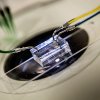Our hearts evolved to pump blood in a pulsing manner. The heartbeat that nearly the entire body experiences may be important for a variety of biological processes, but laboratory experiments are normally performed without accounting for this factor. Now researchers at the University of Michigan have developed a microfluidic chip that uses gravity and pressure differences to simulate a pulsating microenvironment within which tests can be performed.
The chip costs pennies to produce, consisting of nothing but carefully produced lithographed silicon rubber. The device can be preloaded to be fed by a specific mix of cells, compounds, and corresponding media, and left to pump them through for hours to get a perspective of what effect pulsed rhythms have on different processes.
source:ns.umich.edu
Lab-on-a-Chip Simulates Heartbeat for Testing New Drug Therapies

